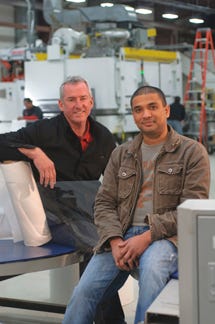MicroGREEN ramps up commercialization with new capital, production, and raw material supply
MicroGREEN Polymers (Seattle, WA) has secured financing and a raw material supply source as it works to commission a new production line and commercialize its patented solid-state microcellular expansion technology called Ad-air. On May 19, the company announced that its Series B round of financing had generated approximately $6.9 million, with investments from Waste Management, WRF Capital, Northwest Energy Angels, and other private investors.
May 19, 2010
MicroGREEN Polymers (Seattle, WA) has secured financing and a raw material supply source as it works to commission a new production line and commercialize its patented solid-state microcellular expansion technology called Ad-air. On May 19, the company announced that its Series B round of financing had generated approximately $6.9 million, with investments from Waste Management, WRF Capital, Northwest Energy Angels, and other private investors.
In addition to capital to help it start up its new line, Waste Management announced that it has also entered into a supply agreement with MicroGREEN, according to that company's President and CEO Tom Malone. The arrangement gives MicroGREEN a ready source of post-consumer recycled (PCR) polyethylene terephthalate (PET), which the company will initially extrude into a sheet, featuring the Ad-air microcellular bubbles that maintain performance while reducing resin usage, and that sheet can then be converted by other processors. Eventually, Malone said the recycled PET will also be thermoformed by MicroGREEN itself, as it readies a second line at its 35,000 ft2 Arlington, WA plant, which will have an inline thermoforming unit supplied by Brown Machines. "It was a pretty easy step for us to imagine a partnership with the largest source of post-consumer recycled PET in North America," Malone said.
|
Tom Malone (left), president and CEO of MicroGREEN, and Krishna Nadella, company co-founder and CTO, pose at the company's new Arlington, WA production plant. |
The company is currently leasing the building in Arlington, WA, with Waste Management delivering PCR PET from its site in Woodinville, WA to an intermediate company that processes the scrap into pellets. MicroGREEN then converts those pellets, with some additional virgin material, into sheet and products diffused with its Ad-air microcellular bubbles. The sheet has varying levels of recycled content as the production process is fine tuned, but Malone anticipates being able to include a very high percentage of recyclate.
The first line at the plant will solely extrude material into sheet, with annual capacity to create around 100 million ft2 of product annually. The second line, which should be operational by the end of this year, will tack a thermoforming machine on the end of the production system for inline conversion of Ad-air sheet into cups, trays, plates, and "all kinds of shapes," according to Malone. In addition to being formed, the sheet can also be applied for printed products like signage and graphic arts applications. At this point in time, the company has 21 employees, but Malone thinks an additional 12 will be brought on over the next six months as production is ramped up.
Malone said MicroGREEN has identified a roughly $25 billion addressable market for its technology that is spread over six manufacturing verticals. Although it sells and has sold licenses into some of those verticals, it's now focused on one market and undertaking the production of sheet and formed parts itself. "[Packaging] is clearly the area where we can make the biggest impact on the environment and grow the company the fastest," Malone said, "so that's why we're focused on it."
Over the long term, MicroGREEN hopes to add additional conversion sites in North America, locating near ready sources of PCR PET like Waste Management recycling sites. To that end, it is already planning a third round of financing. Malone estimates the cost of any new facilities at $12 million apiece.
The union with Waste Management is a mutually beneficial, if not completely coincidental, union. When Malone reached out to the company a little over a year ago, he did so with a familiar person, contacting, Timothy J. Cesarek, managing director in the Organic Growth Group of Waste Management. Prior to joining Waste Management, Cesarek had already been introduced to the Ad-air technology and MicroGREEN by Malone. "So when I made the call," Malone said, "it was simple for [Cesarek] to connect A and B and for me to connect that whole scenario."
About the Author(s)
You May Also Like



